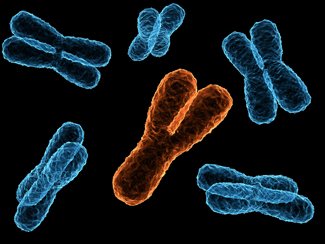
Experts found that men can inherit heart disease from their father after they have tracked the condition to the Y chromosome that dads pass to sons.
By studying the DNA of over 3,000 men, scientists found a particular version of the sex chromosome increases the risk of coronary artery disease by 50%.
The risk it confers is in addition to other heart risk factors like cholesterol, The Lancet reports.
Experts already know that men develop heart disease a decade earlier than women, on average. By the age of 40, the lifetime risk of heart disease is one in two for men and one in three for women.
Lifestyle factors like smoking and blood pressure are important contributors. This latest work suggests the male Y chromosome can also play a role in coronary artery disease.
Dr. Maciej Tomaszewski, from the University of Leicester in UK, and colleagues studied 3,233 biologically unrelated British men who were already enrolled in other medical studies investigating heart disease risk.
When they carried out genetic tests on the men they found that 90% possessed one of two common versions of Y chromosome – named haplogroup I and haplogroup R1b1b2.
And the risk of coronary artery disease among the men carrying the haplogroup I version was 50% higher than in other men.
The scientists say they now need to pinpoint precisely which genes on the Y chromosome are responsible.
But they believe they already know how they exert their effect – by upsetting a man’s immune system.
Dr. Maciej Tomaszewski, a clinical senior lecturer at the University’s Department of Cardiovascular Sciences, said: “We are very excited about these findings as they put the Y chromosome on the map of genetic susceptibility to coronary artery disease.
“Doctors usually associated the Y chromosome with maleness and fertility but this shows it is also implicated in heart disease.”

He said, ultimately, the discovery could lead to new ways to treat and prevent heart disease in men, as well as a genetic test to spot those at greatest risk.
In the meantime, Dr. Maciej Tomaszewski said men should focus on risk factors that they already have the power to modify themselves, such as getting enough exercise and eating a healthy diet to keep their blood pressure and cholesterol down.
Dr. Hélène Wilson of the British Heart Foundation, which part-funded the work, said: “Coronary heart disease is the cause of heart attacks, which claim the lives of around 50,000 UK men every year.
“Lifestyle choices such as poor diet and smoking are major causes, but inherited factors carried in DNA are also part of the picture. The next step is to identify specifically which genes are responsible and how they might increase heart attack risk.”